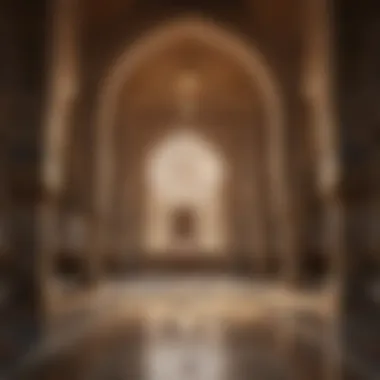Unveiling the Intricacies of the Islamic Calendar 2022: A Detailed Exposition


Horoscope Prediction
The exploration of the Islamic calendar of 2022 reveals a tapestry of significant months, dates, and cultural events based on the lunar system used in Islamic tradition. This comprehensive guide aims to unveil the intricacies of the Islamic calendar for the upcoming year, shedding light on the relevance of each Hijri month and delving into the major holidays and observances that mark the Islamic lunar year.
Zodiac Compatibility
As we navigate through the Islamic calendar of 2022, it is intriguing to draw parallels between celestial events and the compatibility potential between different zodiac signs. By exploring the love matches and friendship dynamics among specific zodiac pairs, we can uncover intriguing insights into the interplay of astrological influences within relationships and friendships.
Celestial Events
Within the tapestry of the Islamic calendar lies a canvas of celestial events that offer unique astrological significance. From highlighting upcoming astrological events to explaining the effects of retrograde planets on each zodiac sign, this section aims to unravel the mysterious dance of the celestial bodies and their impact on personal growth and cosmic energies.
Astrology Insights
Embark on a journey through the realm of astrology, where comprehensive guides on zodiac signs' traits and characteristics await. By exploring the influence of the twelve astrological houses on various life aspects and discussing the pivotal role of planets in shaping astrological interpretations, we can deepen our understanding of the cosmic forces at play.
Astrology Lifestyle
Embrace an astrology-infused lifestyle with wellness tips that align with astrological guidance, offering personalized self-care practices and wellness routines tailored to each zodiac sign. From suggesting style and beauty choices based on zodiac personality traits to providing relationship advice honed to the dynamics of different zodiac signs, this section offers a holistic approach to integrating astrology into daily life.
Introduction to the Islamic Calendar
Brief Overview of the Islamic Calendar


Origin and Significance of the Islamic Calendar
Diving into the Origin and Significance of the Islamic Calendar unveils a rich history that dates back to the days of Prophet Muhammad. This section outlines the pivotal moments that led to the creation of this unique calendar, emphasizing its lunar-based system. The Islamic calendar's establishment marked a fundamental shift for Muslims, providing a distinct temporal framework rooted in religious practices and celestial observations. Exploring the inception of this calendar offers a profound insight into the early Islamic community's organizational prowess and their commitment to aligning with the lunar cycles for religious obligations.
Lunar-Based System of the Islamic Calendar
The Lunar-Based System of the Islamic Calendar serves as a cornerstone of Islamic timekeeping, intricately linked with the phases of the moon. This section elaborates on the cyclical nature of the lunar calendar, detailing its relevance in determining key events like Ramadan and Hajj. Embracing a lunar-based approach underscores the Islamic emphasis on nature's rhythms and the spiritual significance attributed to moon sightings. While offering a fluid and dynamic temporal framework, the lunar calendar also poses challenges in aligning with the solar year, creating a perpetual interplay between celestial observations and religious duties.
Importance of Islamic Months
Role of Lunar Months in Islamic Tradition
Unraveling the Role of Lunar Months in Islamic Tradition showcases the profound impact of lunar cycles on shaping Islamic rituals and customs. This segment delves into how each lunar month carries distinct spiritual connotations, influencing fasting, prayers, and community gatherings. Understanding the significance of lunar months underscores the deep spiritual connection that Muslims maintain with the cosmos, fostering a sense of unity and temporal awareness. While the lunar months provide a flexible framework for religious practices, they also demand vigilance in moon sightings and adherence to traditional observances.
Significance of Hijri Months
The Significance of Hijri Months highlights the historical and cultural importance of the Hijri calendar within the Islamic community. This section elucidates the narrative behind each Hijri month, exemplifying the unique events and commemorations that shape the Islamic calendar. By exploring the nuances of each Hijri month, individuals gain a deeper appreciation for the richness of Islamic heritage, unraveling the layers of tradition and spirituality interwoven within each month. Recognizing the significance of Hijri months underscores the enduring relevance of Islamic history and the collective memory preserved through lunar-based chronology.
Key Months in the Islamic Calendar of
The Islamic calendar of 2022 holds profound significance, encapsulating a tapestry of key months that shape the spiritual and cultural landscape for Muslims worldwide. As we delve into the essence of these months, we uncover a mosaic of traditions, observances, and celebrations that mark the passage of time in alignment with the lunar calendar system. Each month carries its own legacy and importance, weaving a narrative that reverberates through communities, fostering a deep sense of connection and spirituality.
Muharram
Observances and Commemorations


Muharram stands out as a poignant month within the Islamic calendar, marked by solemn observances and commemorations that echo with historical significance. The rituals and practices during Muharram bear witness to the martyrdom of Imam Hussain and his companions at the Battle of Karbala, serving as a reminder of sacrifice and devotion for Muslims across the globe. The somber atmosphere of Muharram cultivates introspection and spiritual reverence, inviting believers to reflect on themes of resilience, faith, and sacrifice as they partake in various rituals to honor the memory of the martyrs.
Safar
Events and Practices
Safar brings a contemplative tone to the Islamic calendar, beckoning believers to engage in self-reflection and spiritual renewal. This month is often associated with dispelling superstitious beliefs and seeking protection from potential harm, emphasizing the importance of relying on faith and perseverance during challenging times. Safar serves as a reminder that trials and tribulations are an inherent part of life's journey, urging individuals to approach difficulties with patience, fortitude, and trust in the divine wisdom that guides their path.
Rabi' al-Awwal
Celebrations and Traditions
Rabi' al-Awwal ushers in a spirit of joy and celebration, marked by the observance of the birth of the Prophet Muhammad. This auspicious month is imbued with festivities, charitable acts, and expressions of love and veneration for the Prophet. Muslims around the world come together to commemorate the Prophet's teachings, virtues, and legacy, emphasizing the significance of his life as a beacon of guidance and exemplar of compassion, wisdom, and righteousness in all aspects of human conduct.
Islamic Holidays and Observances in
In the vast landscape of the Islamic calendar for 2022, the section on Islamic Holidays and Observances stands out as a beacon of cultural and spiritual significance. These sacred days not only mark observances but also serve as pillars of communal unity and reflection within the Muslim community. Understanding and honoring these holidays carry profound importance in preserving traditions, fostering connections, and celebrating faith. Through exploring the essence of these Islamic holidays in 2022, individuals can delve into the rich tapestry of customs, rituals, and social practices that define these occasions.
Eid al-Fitr
Celebrations and Customs
Delving into the fabric of Eid al-Fitr unveils a tapestry of celebrations and customs that exemplify the joyous culmination of Ramadan. This pivotal feast is a time of immense communal jubilation, marked by feasting, prayers, and acts of charity. The intricate blend of festive gatherings, culinary delights, and spiritual reflections during Eid al-Fitr encapsulates the essence of gratitude and fellowship. The unique tradition of sharing sweet treats like 'Eid ka meetha' and 'Sheer Khurma' amplifies the festive spirit, creating a sense of unity and abundance among participants. The enduring appeal of Eid al-Fitr celebrations lies in their ability to foster goodwill, compassion, and familial bonds, making them a cherished and integral part of the Islamic calendar traditions.


Eid al-Adha
Feasts and Sacrifices
Exploring the tradition of Eid al-Adha unravels a tapestry of feasts and sacrifices that symbolize steadfastness in faith and devotion. This solemn occasion commemorates Prophet Ibrahim's willingness to sacrifice his son Isma'il as an act of obedience to God. The characteristic feature of Eid al-Adha lies in the communal sacrifice of livestock, symbolizing sharing abundance and remembering the importance of sacrificial commitment. The ritual of distributing meat among family, friends, and those in need emphasizes generosity, empathy, and solidarity within the community. The unique blend of culinary traditions, charitable acts, and spiritual reflections makes Eid al-Adha a poignant reminder of selflessness, faith, and connectedness, underscoring its profound significance in the Islamic calendar.
Islamic New Year (Hijri New Year)
Traditions and Festivities
The Islamic New Year heralds a time of reflection, renewal, and spiritual rejuvenation within the Muslim calendar. The traditions and festivities surrounding the onset of the Hijri year encapsulate a blend of solemn observance and hopeful beginnings. Muslims worldwide mark this occasion with prayers, supplications, and contemplation on the passage of time and the importance of spiritual growth. The unique feature of the Islamic New Year lies in its role as a time to seek forgiveness, set intentions for the year ahead, and deepen one's connection to faith and community. The rich tapestry of traditions, including reciting prayers, fasting, and engaging in acts of benevolence, underscores the symbolic significance of this occasion as a time of introspection, gratitude, and commitment to spiritual values.
The Prophet's Birthday (Mawlid al-Nabi)
Commemorations and Celebrations
The commemoration of the Prophet's Birthday unfolds a tapestry of commemorations and celebrations that honor the life and teachings of Prophet Muhammad. This joyous occasion serves as a moment of reflection, gratitude, and spiritual connection for Muslims worldwide. The key characteristic of Mawlid al-Nabi lies in the retelling of the Prophet's life story, virtues, and teachings through lectures, poems, and communal gatherings. The unique feature of these commemorations lies in their role in fostering love, reverence, and emulation of the Prophet's noble example. By engaging in acts of charity, remembrance, and learning, participants express their devotion and commitment to upholding the Prophet's legacy of compassion, humility, and social justice within the Islamic calendar.
Conclusion
In dissecting the intricate workings of the Islamic Calendar of 2022, it becomes abundantly clear that delving into the significance and nuances of this lunar-based system offers a profound insight into Islamic traditions and cultural practices. This comprehensive guide not only sheds light on the key months, dates, and events that shape the Islamic calendar but also serves as a valuable resource for understanding the rhythm of time in the Muslim world. By exploring the Hijri months and major holidays, we unravel a tapestry of beliefs and observances that not only mark specific points in the year but also encapsulate the spiritual essence of the Islamic faith. The Islamic calendar, with its unique blend of lunar calculations and cultural customs, stands as a testament to the richness and depth of Islamic heritage.
Reflections on the Islamic Calendar of
Implications for the Muslim Community
Undoubtedly, the implications of the Islamic Calendar for the Muslim community are far-reaching and profound. The calendar serves not just as a tool for marking time but as a symbol of unity and shared heritage among Muslims worldwide. Its lunar-based system not only shapes religious practices but also fosters a sense of togetherness and community spirit, especially during significant events like Ramadan and Hajj. The cyclical nature of the Islamic calendar reinforces the core values of Islam, emphasizing principles of patience, reflection, and devotion. This interconnectedness through time solidifies the bonds within the Muslim ummah, underscoring the importance of tradition and collective worship.
Cultural Significance of Islamic Calendar Events
Examining the cultural significance of events within the Islamic calendar unveils a tapestry of traditions and beliefs that have been passed down through generations. Each celebration, be it Eid al-Fitr or Mawlid al-Nabi, carries with it a rich history of customs and rituals that reflect the diversity and vibrancy of Islamic culture. These events not only serve as moments of joy and commemoration but also as anchors that connect Muslims to their past and heritage. The blending of spiritual practices with cultural observances highlights the intricate relationship between faith and tradition, offering a glimpse into the multifaceted tapestry of Islamic civilization. Embracing the cultural facets of Islamic calendar events enriches the understanding of Islam as a dynamic and living tradition, resonating with believers and non-believers alike.







